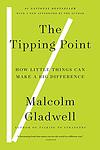Malcolm Gladwell
Malcolm Gladwell is a Canadian journalist, author, and public speaker. He has been a staff writer for The New Yorker since 1996. Gladwell gained popularity for his unique perspective on social sciences, which he often explores through the lens of psychology and sociology. His books, including 'The Tipping Point,' 'Blink,' 'Outliers,' and 'David and Goliath,' have become bestsellers, known for their exploration of the factors that contribute to high levels of success.
Books
This list of books are ONLY the books that have been ranked on the lists that are aggregated on this site. This is not a comprehensive list of all books by this author.
-
1. The Tipping Point
This book explores the concept of "tipping points," or the specific moment when an idea, trend, or social behavior crosses a threshold and spreads like wildfire. It delves into the science behind epidemics, both in terms of diseases and ideas, and dissects the factors that can cause a sudden shift in public consciousness. The author uses various case studies, from the sudden popularity of certain shoes to the decrease in New York City's crime rate, to illustrate these concepts.
-
2. Outliers
The book examines the factors that contribute to high levels of success. Through a compilation of anecdotes and analyses of various cultural phenomena, it argues that success is not simply a result of individual talent or intelligence, but rather the result of a combination of opportunities, hidden advantages, cultural legacies, and the amount of time spent practicing a specific task. The author challenges the traditional notion of the "self-made" individual by emphasizing the importance of external influences and timing, such as being born in a certain era or having access to specific resources, in shaping one's ability to achieve extraordinary accomplishments.

